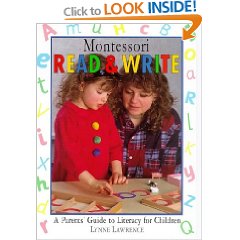I dug through my notes and discovered a book called Montessori Read and Write by Lynn Lawrence. I stumbled upon some interesting comments about learning principles which I have summarised here. I included my own for your lifelong language learning experience.
PRINCIPLES OF LEARNING
Only you can learn for yourself:
How does one learn to read? If you do not know how to speak but you have a voice, you are not a dumb. You are a silent or quiet person. But if you do not know how to read, the English word for it is illiterate. How is it that there is a label for one (reading) and not the other (speak), when in fact, works that go into speech, writing and reading come from the source, YOU.
I often encourage to approach learning in three simple steps: Listen first, Speak and Sing More, Read Later. Reading is not opening a chapter on the PDF file you just downloaded and not printed out. Reading has a few elements involved, sense of touch (of the book and pages), and sense of sight (seeing the words). The rest is purely mental. It is this mental effort that differentiate reading from writing and speaking. My daughter speaks and writes Mandarin well, but when it comes to reading, she is still not fluent without the help of transliteration (Han Yu Pin Yin).
Speaking is the motor translation of words that you already heard.
Writing is the motor translation of words that you already know.
Reading, however, “form part of the abstract intellectual culture which is the interpretation of ideas represented by graphic symbols, and is acquired much later.” (Maria Montessori, The Discovery of the Child)
To be able to read, you need to first make the association between sounds and the graphic symbols, before you can interpret the meaning for this association. Henceforth, if I say the beginning sound of the word ‘chrysalis’ has the same sound as ‘k’, you would be puzzled when you read the word later because the blending sounds of ‘ch’ is not ‘k’ but ‘che’ like in cheese. The mind begins to think and intellectually, it becomes a source for learning.
Create the right condition for learning.
The idea is to create a learning environment which has both natural and prepared elements. A short introduction on how to create a new environment has been written, click here to take you there. This topic will be useful for people who are living overseas as foreign expats or students.
Learn at your own pace
There is time to eat, play and sleep. The natural cycle of life allows one to discover things and new knowledge at the prime of his learning. If you force knowledge, it will not become useful to either you or your society. The languages that I have learnt outside school environment, which I discover on my own are more practical than the languages that I learnt formally in school.
Many people make lots of money using very average English.
Just this morning, my favourite fishmonger at the market asked me how to spell ‘blaugh’ whilst I had bought $35/- worth of seafood. Who’s the cleverer of the two? After I left, he was $35/- richer and learnt a new word, and I walked away with just fresh seafood for the family and $35/- less in my purse.
Simplicity will lead to discovery
Leave what you don’t know to be part of a journey to discovery of new things and of things you may already taken note of and needing indepth knowledge. I cite an example on internet blogging. For a long time, I have wanted to add what you call the ‘meta tag’ on my website so that the spiders can crawl through well enough to increase my hit rate or ranking if you like. For a long time, I am afraid to add or edit the html codes on wordpress because I thought it might involve some very technical procedures which would surgically destroy my website. So for a long time, I did nothing because of this fear.
I decided to give a try. I stared at the wordpress settings on my admin, searched down below the list for the plugin and found one just for that purpose. What I did later was intuitive: I discovered that I failed to read between the lines – you can use meta tag to rest between the pages of your post – I do not have to know html. How silly?! Why didn’t I read that before? I activated the plug-in and true enough a simple headspace meta data description box appears on my write page.
Assess how much you know is new and what you are doing is already known
You avoid duplication of content in the knowledge you have already acquired, and you bring yourself to focus and concentrate on the fine line between what is necessary and redundant.


